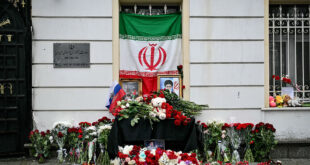TEHRAN (AP) — UN Secretary General Kofi Annan found little satisfaction at the close of a two-day visit to Iran on Sunday, snubbed by the country’s leader over international demands for Tehran stop enriching uranium and ignored in warnings not to use questions about the Holocaust to incite hatred.
In a move that coincided with Annan’s visit, Iran announced Sunday it would host a conference to examine what it calls Holocaust exaggerations, likely to deepen the country’s international isolation.
Annan also reiterated his displeasure over an exhibition in Tehran of cartoons on the Holocaust, just hours after the Iranian foreign ministry spokesman said Iran planned to hold a conference this fall questioning the extent of the Holocaust.
“I think the tragedy of the Holocaust is an undeniable historical fact and we should really accept that fact and teach people what happened in World War II and ensure it is never repeated,†Annan told reporters after meeting President Mahmoud Ahmadinejad, who was not at the news conference with the UN chief.
On Saturday, Annan had raised concerns over the exhibition in talks with Iranian Foreign Minister Manoucher Mottaki, telling him “we should avoid anything that incites hatredâ€, according to the UN chief’s spokesman Ahmad Fawzi.
Responding to renewed European diplomatic efforts over Iran’s nuclear programme, Ahmadinejad said he favoured negotiations but would not halt uranium enrichment as a condition for talks, according to Annan’s account of his talks with the fiery leader.
Annan’s visit to Tehran came after Iran ignored a United Nations deadline to halt uranium enrichment by the end of August, opening the door to possible UN sanctions over concerns that Iran is building nuclear weapons.
“On the nuclear issue, the president reaffirmed to me Iran’s preparedness and determination to negotiate†a solution to the nuclear impasse, Annan said at the concluding news conference with Mottaki.
However, Ahmadinejad “reiterated that he did not accept suspension before negotiations,†the UN chief said, conveying Iran’s rejection of a condition set by the five permanent members of the UN Security Council plus Germany.
In June, the so-called 5+1, offered Iran an incentives package to limit its nuclear programme.
On Saturday, the first day of Annan’s visit, Ahmadinejad reiterated at a rally that Tehran would continue its nuclear activities. Tehran hid its nuclear programme for 18 years and its continued lack of transparency and obstruction of international inspectors has raised concerns that it is trying to produce fuel for a nuclear warhead. The oil-rich country insists its programme is peaceful, designed to generate electricity.
Iran’s slowness in responding to the package prompted the Security Council to issue a resolution July 31 requiring it to halt uranium enrichment by the end of August.
On Sunday, Mottaki said the council issued the resolution “under pressure from the United States and Britain†and described it as a “mistake†and a “black mark against them.†Iran effectively rejected the package August 22 by refusing the condition that it stop enriching uranium before talks could begin. The content of its response has not been made public.
State television quoted Ahmadinejad as saying that he was ready to negotiate, but that the onus was on Western countries repair relations with Tehran.
“Iran’s trust has been undermined during the past three years,†he was quoted as saying about the period over which talks with Western powers have taken place. “They [the West] should try to win our trust to solve the issue.†Although Iran’s violation of the UN deadline opens the way for sanctions, the likelihood of immediate punitive measures appears in doubt.
Annan said before arriving that he hoped they could be avoided to prevent a further escalation of tensions in the region. Permanent veto-wielding council members Russia and China — who have strong trade ties with Iran — oppose sanctions.
Iran hinted on Saturday that it could reduce its cooperation further if punitive measures were implemented.
Its envoy to the International Atomic Energy Agency, Ali Asghar Soltanieh, warned that Tehran could block access by the UN nuclear watchdog’s inspectors if it faced sanctions.
“In the civilised world, the language of threat, intimidation would not work,†Soltanieh said Sunday on CNN, commenting on the US drive for sanctions against Iran.
“The solution to the crisis is to come back to negotiating table without any condition,†he said.
Mediation efforts are set to shift to the European Union, whose top diplomat Javier Solana plans to meet with Iran’s chief nuclear negotiator Ali Larijani in the coming days.
After an EU foreign ministers meeting in Finland, the bloc said Saturday that there was no deadline for the talks to produce results but warned it would not give Iran much time.
Iran appeared more responsive to UN concerns regarding Lebanon, where Tehran is a backer of the Hizbollah group and is believed by many to be its top arms supplier.
Ahmadinejad “reaffirmed his country’s support for the implementation of resolution 1701,†Annan said of his discussions about the UN ceasefire resolution that ended the 34-day war between Israel and Hizbollah in Lebanon and includes measures to prevent the rearming of the powerful group.
But the UN chief did not disclose the specifics of his talks on the topic with the Iranian president. Mottaki, after meeting Annan Saturday, made a vague promise to support the resolution, but did not directly mention Hizbollah.
Annan said Friday that Syria — another key ally of Hizbollah — promised to patrol its side of the frontier to prevent arms deliveries, though Israel was sceptical it would really do so.
Annan’s two-day visit to the Iranian capital is part of a Middle East tour that has taken him to Lebanon, Israel and Syria. His coming stops include Saudi Arabia, Egypt and Turkey.Â
 Eurasia Press & News
Eurasia Press & News



